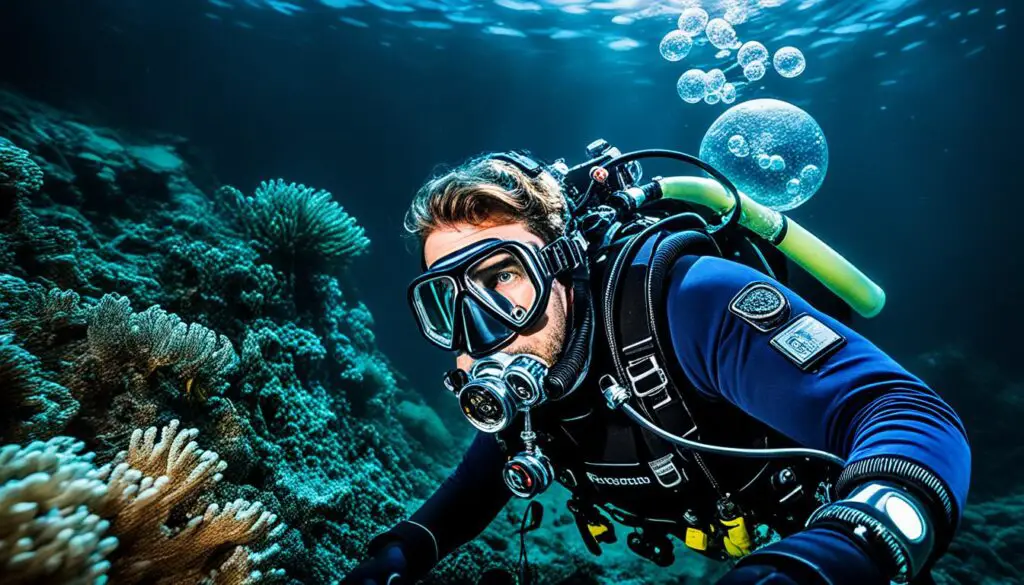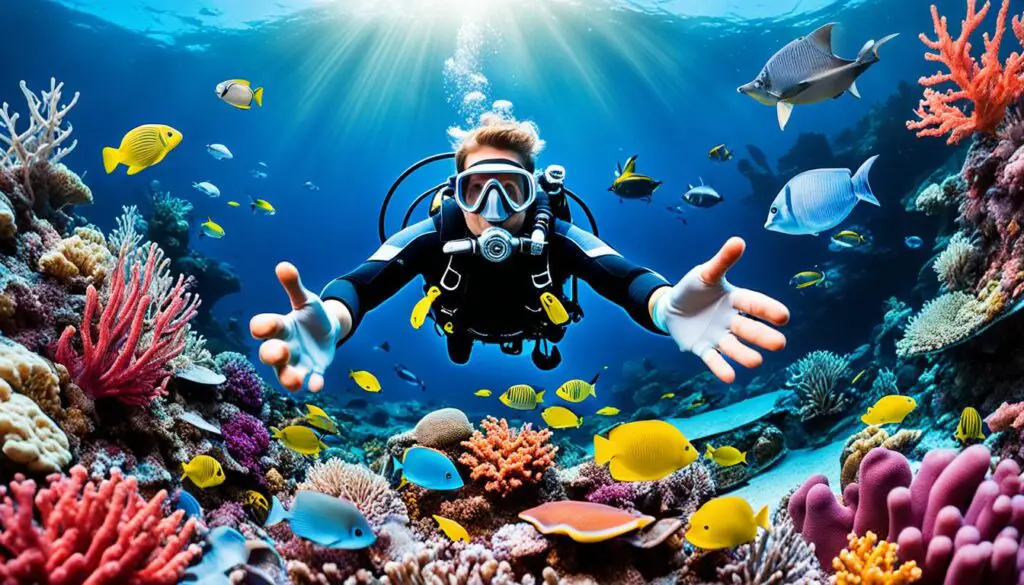Dive instruments are key for anyone who loves the underwater world. They make diving both safe and exciting. With new tech, diving has gotten even better. This article will show you the newest and most important dive instruments for a great diving trip.
Key Takeaways:
- High-tech dive instruments are crucial for a safe diving experience.
- Advancements in technology have transformed the way we explore underwater.
- Discover the latest high-tech dive instruments to enhance your diving journey.
The Importance of Technical Diving
Technical diving is key to discovering deeper parts of the sea. It lets divers go beyond what’s typical, into unknown waters. To go deep, you need more than regular scuba gear. You need special training, high-tech gear, and know-how about mixed gases.
The Recreational Limit
Recreational diving has a depth limit of about 40 meters. After that, the danger increases. To go deeper, we need technical diving. It lets us see the world below 90 meters, where amazing sights wait.
Specialized Training and Equipment
Technical diving is different from what most people do under the sea. It needs special training to handle the risks and complexities. Divers learn about gas, decompression, and what to do in an emergency. With this, they can explore safely.
Special gear is a must for technical diving. There’s open-circuit and closed-circuit types. Each uses different tools for breathing. This gear lets divers go deeper than ever before.
Exploring with Mixed Gases
Mixed gases are vital for deep technical dives. They include helium, nitrogen, and oxygen. Using these gases reduces the risk of getting sick while diving. They also let divers stay underwater longer.
Technical diving takes you to a world few ever see. It needs more knowledge, training, and gear than regular diving. But the chance to explore unseen places is worth it.
Technical diving changes what’s possible underwater. It lets adventurers descend far beyond the usual limits. With the right training and gear, we can see the sea’s hidden wonders.

Starting Your Diving Adventure
Before starting your diving adventure, you should know about the different types. There’s freediving, scuba diving, and snorkeling.
Freediving is about diving on just one breath. You’ll see the quiet beauty of the underwater world. It takes discipline and focus.
Scuba diving is the key to exploring beneath the waves. You get to use special equipment like tanks and regulators. This allows you to stay longer underwater and see amazing things. From colorful coral reefs to big sea animals, it’s an adventure like no other.
Snorkeling is a simpler way to see marine life. All you need is a mask, snorkel, and fins. It’s easy for anyone, young or old, to enjoy.
Taking a diving course is a smart first step, no matter your diving choice. This training teaches you how to use equipment, dive safely, and enjoy your time underwater. It’s a must for anyone serious about diving.
You’ll also need the right gear for your dive. Fins make swimming smoother, masks offer clear sight, and snorkels or regulators provide air. Reliable equipment is crucial for your safety and fun.
The Benefits of Diving Courses:
- Learn essential diving skills and techniques
- Understand safety procedures and emergency protocols
- Gain confidence and comfort in the water
- Expand your knowledge of marine life and ecosystems
- Connect with fellow diving enthusiasts and join a vibrant community
“Diving gives me the opportunity to escape the hustle and bustle of everyday life and immerse myself in a serene and fascinating underwater world.” – Jane Doe, avid diver

| Type of Diving | Main Equipment |
|---|---|
| Scuba Diving | Tank, regulator, buoyancy control device, mask, fins |
| Freediving | Mask, snorkel, freediving fins |
| Snorkeling | Mask, snorkel, fins |
Conclusion
Diving and discovering the underwater world is very exciting. With advanced dive gear and proper training, divers can be safer and explore more. These new dive tools have changed the way we dive, giving us amazing ways to enjoy the water.
High-tech gear has made both technical and recreational diving better. Now, divers can go further and see more with these tools. They make diving safer by helping divers check important info, find their way, and talk while underwater.
For divers of any level, having the best dive gear is key. It allows you to explore oceans deep with peace of mind. So, get those high-tech tools and dive into adventures. Find the hidden wonders of the sea and make lasting memories.
FAQ
What are dive instruments?
Dive instruments are special tools that monitor diving conditions like depth and time spent underwater. They help divers stay safe and have fun while exploring the deep sea.
How do high-tech dive instruments revolutionize diving?
Advanced dive instruments have changed how we discover the undersea world. They offer accurate real-time data to improve safety and decision-making during dives.
What is technical diving?
Technical diving is a more advanced kind of scuba diving. It allows divers to go deeper than normal using special techniques, equipment, and gas mixes.
What are the types of technical diving?
There’s open-circuit and closed-circuit technical diving. Open-circuit uses traditional scuba gear. Closed-circuit re-breathes the air you breathe out, saving on gas.
What are the advantages and risks of technical diving?
Technical diving lets you explore further depths, but it’s not without risks. These risks include decompression sickness and the need for accurate stop times. Training and safety are key for managing these dangers well.
What are the different types of diving available?
The main types are freediving, scuba diving, and snorkeling. Freedivers hold their breath while diving. Scuba divers use equipment for longer ventures, while snorkelers stay at the surface.
What should I do before starting a diving adventure?
Start with a diving course to learn the basics and how to be safe. Courses teach you about gear, techniques, and safety, making you ready for the dive.
What equipment do I need for diving?
Diving gear includes things like fins, masks, and tanks for air. The items you need depend on the diving type and what’s most comfortable for you.
How can high-tech dive instruments enhance diving safety?
These tools offer precise data on your dive, keeping you informed about your environment. This lets you track your air, depth, and time, making sure you dive safely.
